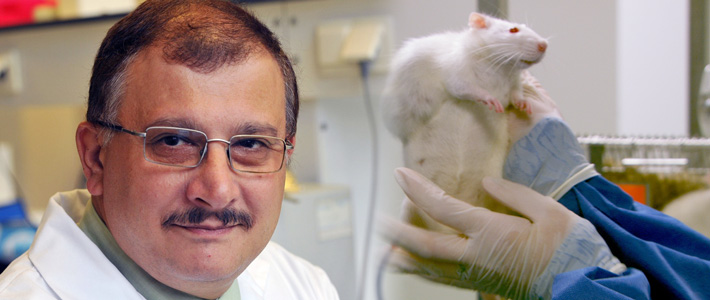
Prof Gilles-Eric Seralini will visit the UK in September to speak about his research on GM health risks.
The GM health study they don’t want you to know about
Claire Robinson
GMhealthriskweek.org, August 2013
http://www.gmhealthriskweek.org/the-study-that-should-have-been-a-wake-up-call-to-the-world/
The most detailed scientific study ever conducted on the health effects of a genetically modified (GM) food was published last year. The findings of the study, led by Prof Gilles-Eric Séralini at the University of Caen in France, were shocking. Rats fed over a two-year period with two Monsanto products, a GM maize and tiny amounts of the Roundup herbicide that the maize is engineered to tolerate being sprayed with, had increased rates of severe organ damage, tumours, and premature death.[1]
The study should have been a wake-up call to the world, but most members of the public and the scientific community are in danger of learning nothing from it. The reason? Within hours of the study’s release, an orchestrated media campaign swung into action to discredit it.
Quotes from scientists criticizing the paper were circulated by the UK-based Science Media Centre (SMC), an organization which claims to be independent and to aim to ensure the public have access to the best scientific evidence[2] – while at the same time taking funding from GM companies.[3] SMC director Fiona Fox later said that she took pride in the fact that the SMC’s “emphatic thumbs down had largely been acknowledged throughout UK newsrooms”. Few newspapers had covered the story, and those that did “used quotes supplied by the Science Media Centre”. She added that several television news programmes had also rejected the story after reading the quotes.[4]
The SMC’s efforts ensured that few British people heard about the study and many of those who did swallowed the SMC line that it was rubbish.
Now you have a once-in-a-lifetime chance to cut through the misinformation and spin that was fed to us and to hear the inside story of the study that’s got the GM industry – as well as scientists whose careers depend on it – seriously worried. Prof Séralini will visit the UK from September 2-8 on a rare speaking tour, to discuss the health risks posed by GM foods. He’ll speak in London, Cardiff, and Edinburgh as part of an expert panel.
Other panel members will include Ib Pedersen, a Danish farmer who found digestive and reproductive problems in his pigs when they ate GM feed and restored them to health by substituting a non-GM diet. Ib’s experience shows that toxic effects from a GM diet are not just something that happens to rats in a lab but that potentially put at risk all livestock – and all people.
There are powerful forces that don’t want you to hear this message. The US is currently trying to force GM foods into Europe through the EU-US free trade agreement and sees Britain as the weak link in European resistance to GM. That’s not because the British people want GM – they overwhelmingly do not – but because our government is rabidly pro-GM and is moving in lockstep with US government interests on the issue. Environment secretary Owen Paterson acts as a mouthpiece for GM industry talking points, even promising that the UK will ignore opposition to GM from the rest of Europe and “go it alone” on GM.
So please come to hear Prof Seralini and the other speakers. It’s never been more urgent that British citizens arm themselves with the information they have to offer.
Claire Robinson is editor of GMOSeralini.org, a public information website to counter misleading spin about the Séralini study.
She is an editor at GMWatch and research director at Earth Open Source.
[1] Séralini, G. E., et al. (2012). Long term toxicity of a Roundup herbicide and a Roundup-tolerant genetically modified maize. Food and Chemical Toxicology 50(11): 4221-4231.
[2] Science Media Centre (2013). Home page. http://www.sciencemediacentre.org/
[3] Powerbase (2013). Science Media Centre. http://www.powerbase.info/index.php/Science_Media_Centre
[4] Matthews, J. (2012). Smelling a corporate rat. Spinwatch, 11 December. http://www.spinwatch.org/index.php/issues/science/item/164-smelling-a-corporate-rat









